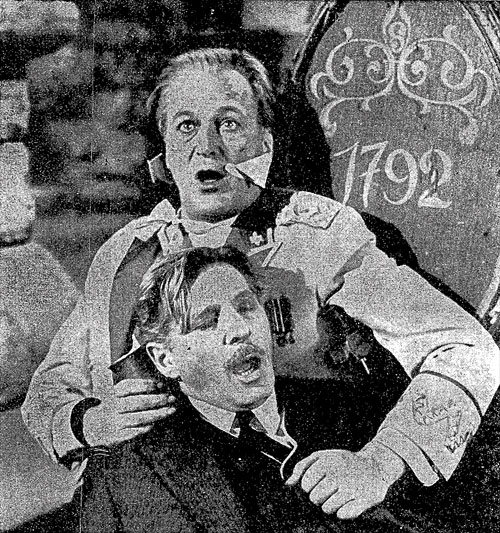|
The New York Times,
August
24, 1958
LIGHT FROM SHADOWS
Scenarist Traces New Comedy Back to Broadway and Wartime
Memories
By S. N.
BEHRMAN
The story which is "Me and the Colonel" has had a curious
history. From the night Franz Werfel first told it to me it
took three years to reach the theatre. It has taken
seventeen to reach the screen. (See photo below.)
|
 |
|
HARMONIOUS FUGITIVES—Curt Jurgens (top) and Danny
Kaye render a wine-flavored duet during their flight
from the Nazis in "Me and the Colonel." The comedy
is slated to open Tuesday at the Odeon and the Fine
Arts. |
One evening in the spring of 1941, when I was working in
Hollywood, I was invited by Max Reinhardt, who was also
working there, to come to dinner to meet a distinguished
refugee, Franz Werfel. In the pleasant pastime of
denigrating Hollywood, one fact about it, I believe, has
never been brought out, namely that it has been a refuge for
exiled artists as Geneva had been in the eighteenth century
for Voltaire and Rousseau.
I knew Max Reinhardt well and had often reveled in his
hospitality: he was the most gracious host in the world. I
shall never forget another dinner party he gave me in
another house of his—Leopoldskron, the archiepiscopal palace
that was his home in Salzburg, Austria—in August, 1937.
Oncoming Clouds
We sat after dinner in the exquisite baroque library. Felix
Salten, the author of "Bambi," was one of the group.
Hitler's aerie at Berchtesgaden was visible from Max's
terrace.
"Hitler knows," Max told me, "everything that goes on here,
what visitors I have, and how long they stay. He knows
because my servants tell him."
Since then, looking back at that evening, it seems to me
that Max and all that little group of men and women were in
some kind of somnambulism. How is it that they did not know?
Why were they not thinking of escape, of exile?' 'Why were
they sitting there talking of books and music and the
theatre—irrelevancies of civilization when there was no
civilization? There was only the watcher on the mountain top
above them: they had only one .thing to think about, to
escape his vigilance. The great fact of life was the oldest
fictional standby: The Chase.
Well, it was four years later, in Hollywood, and here was
Max sitting at the head of his table again. Opposite me sat
the other refugee, Franz Werfel.
I adored Werfel from the start; you couldn't help it. He was
small, rotund ("I am too thick," he admitted in his
idiosyncratic English) with waved-back hair like Beethoven's
and thick glasses. I knew his books and plays and was
therefore unprepared for his dancing humor.
He told a story that delighted us, an incident of The Chase
that made his plight, he said, almost worth while for him.
It concerned a Jewish-Polish business man, one Jacobowitz,
who had managed to get hold of a car but who couldn't drive.
He fell in with an anti-Semitic Polish colonel, a cavalryman
with a price on his head who could drive, though badly.
Enemies Together
The Pole disliked Jacobowitz, not personally, but on
principle, and it is difficult for a romantic, noble and
dedicated man to abdicate a principle. But Jacobowitz,
perspiring in a hard sell, persuaded the colonel to stretch
a point. About this odd deal, Werfel was hilarious. I said
to him: "It's a play. You must write it." He said: "You
write it" I finally did.
Columbia Pictures, unbalanced by the success of the play in
New York, bought the picture rights for a vast sum. Over the
years various treatments were made and duly filed. Three
years, ago, while I was in France, I got a cable from
Gottfried Reinhardt, the son of Max, then a producer at
Columbia, asking if I would work on the script. When I
arrived in Hollywood, a year later, I was handed a screen
treatment worked out by George Froeschel, another Hollywood
refugee. I thought the treatment superb—in many respects
better than the play. I accepted it whole, and it remained
for me only to write the dialogue.
I never re-read an old play of mine, but I was forced, when
I started work on this picture, to read "Jacobowsky and the
Colonel" again. I heard Oscar Karlweiss' voice saying the
lines. I heard Louis Calhern's. They are both dead, but
those who saw their performances will not forget them. I
have never enjoyed any film work as I did this job. "Me and
the Colonel" is the story of a chase. Old hat? Not while men
pursue one another, not as animals do, for sustenance, but
for revenge and self-assertion, for the delusion of
superiority, and the sweet incitement of terror in the
quarry. |